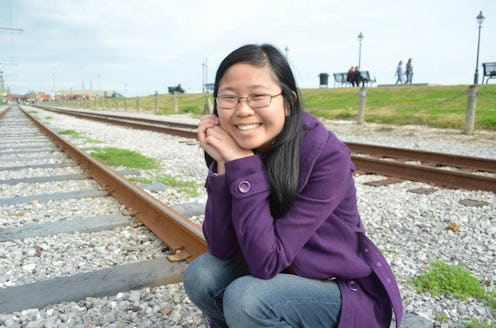
The first time I started to think about my privilege as a disabled person was about six years ago, when I got worried about whether or not my college's disability services would provide me with housing accommodations. "Don't smile too much. Act serious. Otherwise, they won't believe that you're sick," my parents would say right before meetings with disability services. After spending years trying to understand what it means to be disabled, I've realized how deeply important it is for me to advocate for people with disabilities (PWD) and share my personal experiences of pain, confusion, and, ultimately, privilege.
I was born with vocal cord paralysis, a condition that requires me to wear a tracheostomy tube, or trach tube, to help me breathe and function like an able-bodied person. I can't swim because water will get into my tube. I can't participate in sports or run for more than 30 seconds without feeling like my chest is about to burst. And if my trach tube gets blocked, damaged or knocked out for whatever reason (it's happened, and it's awful), I pretty much can't breathe anymore.
And yet, although my disability is physical and clearly visible, I'm much more mobile than a lot of people with disabilities. I can walk, shout, eat, bathe myself, and solve math problems. I can speak for myself, wash my own dishes, and travel. I haven't been diagnosed with any mental illnesses. I'm able to work full-time as a journalist and live on my own in New York City.
If you looked at me now, you might've never guessed that, as a child, I underwent several operations related to the vocal cord paralysis as well as other health conditions, and was frequently in and out of the hospital. You would never know that, growing up, I was a walking, ticking time bomb who had nurses following me around everywhere. In fifth grade, my trach got blocked by hardened mucus and I almost died. A few years later, my then-best friend accidentally knocked my trach out with a baseball bat. 99 percent of the time, though, everything was fine and I didn't need much assistance. As long as my trach was intact and I could breathe, I was OK.
Sometimes, people who have known me for years say they forget that I have a disability. Others who have just met me will say, incredulously, "Wait, you're disabled? That's really surprising. You don't act like you have one." On one hand, statements like this feel like they should be a compliment, in that people can't tell what's "wrong" with me. On the other hand, though, I'm taken aback by their doubt that I belong to the disability community.
During my 24 years of living, I've experienced disability discrimination more times than I can count, as well as discrimination against my race and gender. As a kid, I was bullied for being Chinese and disabled. I've fought for health care insurance, I've needed disability accommodations, and I've had near-death experiences. Yet, it often feels as though I have to justify my identity as a PWD or find validation in my (albeit occasional) feelings of alienation, uncertainty, and bewilderment toward my own body.
As odd as it might sound, sometimes as a disabled person, I have imposter syndrome. For several years, I constantly battled with myself about my identity as a disabled person, often hovering between thoughts of, "I can do it! I'm basically normal" and "I need to accept my disability for what it is." During gym class in elementary school, I insisted to my nurse that I couldn't do a cartwheel because my parents would think it was too dangerous, but she said, "You can do it, Wendy. Just try." I tried. And I did it.
After that, I started to develop a rebellious attitude toward my disability, rejecting the very idea that a journalism assignment or a school field trip or a physical activity was "too much" for my body to handle. Living, working, and making money in New York was a dream I didn't even know I had until I decided to get my master's degree in the city.
But the truth is, so many people don't have that kind of privilege. Even as a disabled woman of color, I try to remind myself that money, time, parental support, and the comparable extent to which I am able-bodied are all privileges that other people from marginalized communities may not have.
At the same time, the disability community is one of the most diverse marginalized groups out there. There are thousands of different types of disabilities — physical and mental, visible and invisible. Even as different disabled people, we have the privilege of not knowing what it's like to have disabilities other than our own.
My privileges and my disadvantages as a person with a disability both inform one another, and have become my motivations as a disability activist. To me, being a disability activist doesn't mean advocating only for people like me. It's also about being there for people who are different from me, who have spent centuries of being an afterthought in political conversations, lacking governmental support, and being stigmatized, ostracized, and treated as "less than" the rest of society.
Additionally, it's my responsibility as a disabled journalist to do my part in covering disability issues in the media, teaching people about the Americans with Disabilities Act (ADA) and disability holidays, accurately portraying PWD in my stories without turning them into inspiration porn, and calling out public figures who continually stigmatize people with mental and physical disabilities. For me, advocating for and reporting within my own community isn't just about "doing my job," but about doing it well.